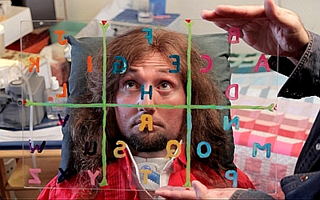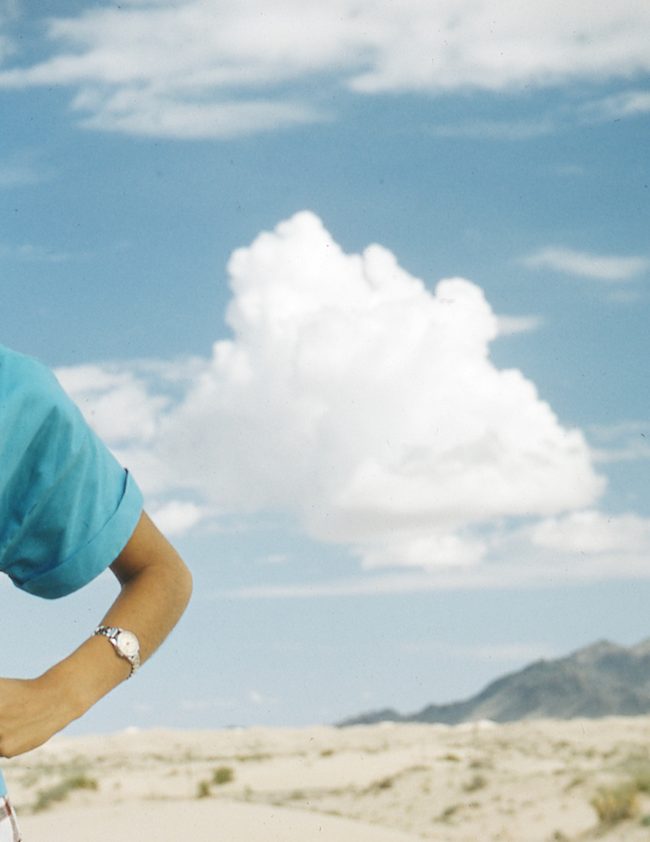JASON BECKER: NOT DEAD YET

(Jason Becker: Not Dead Yet is being distributed in America by Kino Lorber and is now available on DVD. It opened theatrically at Cinema Village in NYC on Friday, December 14, 2012. Visit the film’s official website to learn more.)
I still remember the first time I heard Jason Becker. It was freshman year of college. Birds of a feather flock together, and I’d made friends with the other guitarist on my dorm floor. Walter Scarborough had long hair, wore lots of black, and had a black Ibanez guitar. My hair was short, I wore L.L. Bean, and I had a classical guitar and a Fender jazz bass. One of the first things Walter showed me was Jason Becker. His story was the stuff of legend—a six-string prodigy poised to become the next Steve Vai or Eddie Van Halen but whose career was cut by Lou Gehrig’s Disease while still in his early 20s. I had never heard of Becker before, even though I was familiar with the ’80s metal scene from which he had sprung and the guys he recorded with: Megadeath’s Marty Friedman and former Van Halen frontman David Lee Roth. I wasn’t prepared for what I heard.
Becker was as fierce a shredder as they come, ripping up and down the neck so fast the listener’s ear could hardly keep up. But there was much below the surface that Walter had to point out—the classical-influenced melodies, patterns inspired by Bach’s fugues, and something sweet and tender between the layers of dense distortion and metallic roar. I didn’t totally understand Jason Becker’s genius at the time, though it was no fault of Walter’s own. It’s hard to get over stereotypes, and at that time I wasn’t into ‘80s metal the way I was as a kid; at 18, I was more self-conscious about musical taste than I cared to admit. What I didn’t comprehend was that Becker is the type of musician that breaks such stereotypes. What wasn’t lost on me, however, was the supreme tragedy of Becker’s story—of a creative voice cut down even before its prime by a disease that modern medicine still can’t combat. Jason Becker should have made every kid’s rock ‘n’ roll dreams come true. Instead, he lived a nightmare that few wide-eyed guitarists could possibly imagine.
 The tragedy and triumph of Becker’s life is the subject of a new documentary by first-time filmmaker Jesse Vile. Jason Becker: Not Yet Dead is as head banging as it is heart wrenching. The film is remarkable, accomplishing what many music docs strive for and frequently fail to achieve—namely, it reaches beyond the immediate fans and touches anyone who is willing to watch and, especially, listen. Its power lies in its simplicity and sincerity: Becker’s is a great, naturally compelling life, and Vile skillfully captures both the human and musical sides of his story. Not just for metal heads and six-string samurais, Not Yet Dead is not your usual dose of sex, drugs, and rock ‘n’ roll. Instead, it is a classic tale of the triumph and perseverance of the underdog that often evokes the quintessence of Frank Capra. And with his sweet smile and sincere humility Becker even exudes a Jimmy Stewart- or Gary Cooper-esque charm. Heck, even his favorite expression is wholesome—“Dang!”
The tragedy and triumph of Becker’s life is the subject of a new documentary by first-time filmmaker Jesse Vile. Jason Becker: Not Yet Dead is as head banging as it is heart wrenching. The film is remarkable, accomplishing what many music docs strive for and frequently fail to achieve—namely, it reaches beyond the immediate fans and touches anyone who is willing to watch and, especially, listen. Its power lies in its simplicity and sincerity: Becker’s is a great, naturally compelling life, and Vile skillfully captures both the human and musical sides of his story. Not just for metal heads and six-string samurais, Not Yet Dead is not your usual dose of sex, drugs, and rock ‘n’ roll. Instead, it is a classic tale of the triumph and perseverance of the underdog that often evokes the quintessence of Frank Capra. And with his sweet smile and sincere humility Becker even exudes a Jimmy Stewart- or Gary Cooper-esque charm. Heck, even his favorite expression is wholesome—“Dang!”
Coming from humble, blue-collar roots, Becker fell in love with the guitar as a child and spent every waking moment of his upbringing practicing (he even bought a mini-guitar so he could practice in the car while at stoplights). Like with Jem Cohen’s Fugazi documentary, Instrument, one of the chief pleasures of Not Yet Dead is its soundtrack, filled with intimate home recordings, demos, and other casual recordings that capture the charm and heart of the music, and not just the technical perfection of studio-produced material. From the home movie footage of father and son playing Dylan’s “Mr. Tambourine Man” that opens and closes the film, to the VHS footage of a talent show in which a teenage Becker outshines even Eddie Van Halen with his shredding theatrics, these archival clips not only impress us with the young Becker’s talent, but also introduce a key element of his style: his relaxed technical mastery. Some guitarists shred to impress, but one never feels such cocky, selfish motivation behind Becker. The humility and warmth of his personality, as well as his sincere love for the instrument, comes across in his playing.
 But it is in the last third of the movie where the true heart and soul of Becker’s legacy reveals itself. Had Vile presented Becker merely as a fallen idol, he would have done a disservice to the guitarist and only told part of the story. Instead, he concentrates on how Becker and his supportive friends and family have strived to overcome Amyotrophic Lateral Sclerosis (ALS). In the early days of the disease, Becker was able to use a headset functioning as a mouse to electronically compose and perform the album Perspective. Later, after ALS took even those few remaining motor skills, Becker’s father invented a system of visual cues for his son to communicate. The system is a 3×2 grid, where each box has four letters arranged in a cross. Becker’s first eye movement dictates the box, and the second specifies the letter. Using this language, he can now dictate melodies to his father, who plays them on a guitar.
But it is in the last third of the movie where the true heart and soul of Becker’s legacy reveals itself. Had Vile presented Becker merely as a fallen idol, he would have done a disservice to the guitarist and only told part of the story. Instead, he concentrates on how Becker and his supportive friends and family have strived to overcome Amyotrophic Lateral Sclerosis (ALS). In the early days of the disease, Becker was able to use a headset functioning as a mouse to electronically compose and perform the album Perspective. Later, after ALS took even those few remaining motor skills, Becker’s father invented a system of visual cues for his son to communicate. The system is a 3×2 grid, where each box has four letters arranged in a cross. Becker’s first eye movement dictates the box, and the second specifies the letter. Using this language, he can now dictate melodies to his father, who plays them on a guitar.
It’s difficult to pull off a story like this one—inspirational without seeming cheesy—yet that’s exactly what Vile accomplishes here. He presents Becker as a folk hero in the tradition of so many of Capra’s everymen: Mr. Smith, Mr. Deeds, John Doe, or George Bailey. The dude just doesn’t give up! Becker’s perseverance is infectious, and it’s hard not to be touched by what he’s gone through, all he’s accomplished in the past, and all he continues to accomplish today. In the end, he might not have become the next Eddie Van Halen, but as Not Yet Dead proves, Jason Becker has carved an important musical legacy all his own.
— Cullen Gallagher












Pingback: HOME VIDEO PICKS – Hammer to Nail